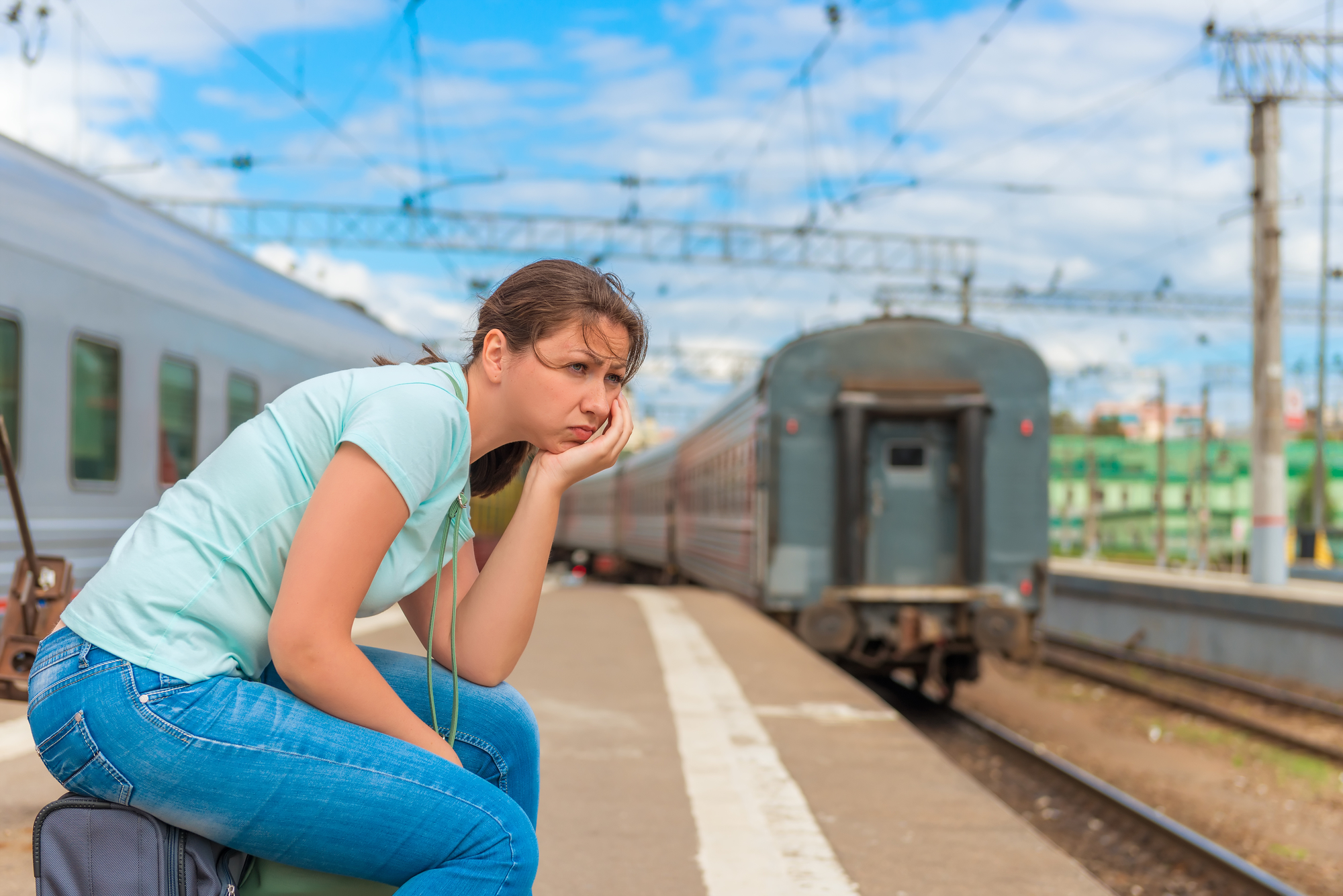
Travel burnout and restoring the magic to life on the road
The emotional high of traveling is not always a feeling that stays for the entire duration of the journey, especially when traveling long term. It’s quite common for the magic of traveling to fade, which can result in decreased fun, travel fatigue or even complete burnout. This is especially true for people digital nomads, who face a lot of challenges and disadvantages the nomadic life. In this article, we’ll explore the main reasons for travel burnout and then supply you with possible solutions to deal with each one. It’s important to understand that in order to overcome travel fatigue, you’re required to take active steps; and your relationship with your travel lifestyle deserves some effort, just like any other relationship. You can’t take it for granted.
Before we do that, a word of caution. The most dangerous type of travel burnout is the one that sneaks up on you for months, without you noticing it. How can you know if you’re infected? There are different degrees and types of travel burnout. If you’re bored and feel like every place looks like the last, if you’re unhappy, constantly agitated, judging people and places harshly and wish you would be somewhere else – you’re either experiencing a severe case of travel burnout, or you’re just living a normal lifestyle. In the case of the latter, keep calm and smile, we can’t help you. We should also note that travel burnout relates to your personal psychology. The following reasons and solutions may or may not apply to you. So after you get some ideas, you should probably spend some quality alone time, and try to figure out things for yourself as well.
Let’s start with the main reasons for travel fatigue:
When you are no longer in love
Just like any other area in life, having something/someone new opens up a world of wonder and creates the experience of feeling falling in love. However, when the dust settles, you are left with what it really is and you get used to it. The longer you travel, the faster you get used to the new environment, and the faster you can feel at home. It’s always funny to remember how it felt to get to a new place just a week ago, in comparison to how it feels now.
Globalisation has a lot to do with it as well. The world is becoming more and more connected, comfortable (especially for those born into the right situation, but also for others), and it’s becoming more and more similar. It is comforting to see that so much connects us, regardless where we’re from; that we all share the same basic tastes for style, aspirations and values. But as time passes, there are less and fewer things that can surprise you. The shock and awe are gone, leaving you with McDonald’s, Thai food and Irish pubs wherever you go.
It’s so easy to travel, yet it’s harder than staying at home
When I took my first trip to Cyprus and South America, more than 14 years ago, I struggled to find a map of the city. Knowing where I am, was a luxury. To find accommodation, I just walked around with my backpack for hours and knocked on doors of hostels that appeared in my sacred Footprint guide, and some that didn’t. I found myself, on occasions, sleeping on the street, or accidentally staying in a brothel for a week (the person at the reception asking for how many hours I need, the super friendly women who were waiting at each door in limited clothing, and the mirrors on the ceilings just seemed like a common Brazilian-style accommodation).
The uncertainty made you travel in “survival mode”, which could easily break you into pieces. But at the same time, it gave you something that is much harder to encounter now – uncertainty. The extreme lack of information was equivalent to adventure. There was a definite adrenaline rush when things feel into place, and especially when they got messed up miserably.
Today, technology levels the ground. We’re all depended on tracking our location with GPS and Google maps, accommodation sites like booking and Airbnb, social apps such as Couchsurfing and Meetup, transportation apps from Uber to blablacar, and the list goes on. The internet offers a constant flow of fresh information, everything is known, hacked and out there for you to find. It can get boring when you get too good at it. But still, traveling is quite an adventure, especially when you just start. Travelers deal with many uncertainties technology can’t fix yet, quick transitions, and an emotional rollercoaster of good and bad moments. Too much of that can also affect you adversely, especially if you don’t catch it in time to take it easy and slow down.
You can’t run away from yourself
Travel is absolutely great for changing your surroundings, and sometimes it allows an amazing escape from your life circumstances. But be warned, there is nothing you can do to escape the nutcase who travels alongside you wherever you go. (I tried. He stays, even when you’re drunk). Travel will expose you to your deepest fears and points of friction. You may be lonely, have bad relationships with people you meet, be strapped for cash, face health issues or any of the other many human conditions, which you’ll also encounter at home. If you’re not in good terms with yourself, long term travel will make you even more venerable than the regular lifestyle, you will have no safe place to run to, but yourself.
Now that we went over some of the main reasons for travel fatigue, let’s examine some of
the things you can do to deal with it:
Change location and atmosphere
Make yourself fall in love with somewhere new. Have you been stuck in Europe for the past four years (I was)? Go to South America or Asia. As we travel long term, we have a tendency to focus on one region for reasons of language, comfort, time zone, relationships, and costs. Go far, go somewhere new where you’ve never been, with a new language, lifestyle, people and landscape. If you lost the spark, changing Prague with Budapest will not do the trick.
Embrace the uncertainty
This one is easier said than done. The idea is to “Get Lost”. For example, I love my routine of getting lost on the weekend. Sometimes you should embrace uncertainty, and stay away from information that is so readily available. Go to a place without knowing what are the major attractions, take a super long walk in nature without much planning, take more risks and enjoy the mess as it happens.
If you really want to increase your level of uncertainty and adventure, pick unusual places with the weird environment and backstory. Isolated Belarus, rapidly changing Myanmar, hectic and mind blowing India or communist Latin Cuba come to mind as relatively safe, yet interesting places. Pick one of those and dive into a new adventure when you need a breath of fresh air.
Get more comfortable and slow down
On the flip side of looking for excitement and uncertainty is dealing with the lack of comfort. Travel is always an adventure since you’re constantly exploring new places. If you’ve had enough of cows headbutting you and monkeys beating you up in India, get yourself back to the developed world and enjoy the comfort and certainty it offers. If you’re constantly staying in dorm hostels and eating street food, indulge yourself in a good quality hotel and a nice restaurant, sleep better and exercise.
The pace of changing locations is also critical, and the faster you go, the more hectic it gets. Customize and play around with the frequency of changing locations, and opt for slow travel for the long term. You are not traveling in order to check off boxes and impress anyone. Make sure your travel style is suitable for who you are, and not for what you think others or your ego expect of you. They don’t really care. With that said, some of us sometimes get stuck in a place too long while being unhappy, because we’re either too lazy or afraid. The world is big, if you stay longer, make sure you are having fun.
Be conscious
Yes, time for some new age (or old age) wisdom. You’ve been traveling long term, and your mind is no longer blown away by the views and new people; so it’s time for you to be blown away by your consciousness, instead. Take a real look at where you are, examine and enjoy the smaller details, and be grateful because everyone keeps on dying, and you’re still here, at least for now.
Instead of searching for excitement and adrenaline rushes, search for fun moments in the sustainable and stable reality in which you live. This is also relevant for interactions with people around you as you travel. Be curious, generous and listen to stories, especially the funny ones but not only. Mary Sojourner has written a wonderful post about fading travel fire and recommends a diet abstaining all your electronic devices, in order to get control back of your senses.
Do new things as you travel and change your story
Other than changing locations, it also makes sense to change your activities, habits and story (who you are) as you travel. My travel style keeps on changing, creating new habits and rules. Start taking more treks or stop doing so many. Start traveling by car, or try boat hitchhiking. Take courses as you travel. Start running, volunteer, go to museums, stop going to museums, get hosted in Airbnb and Couchsurfing. It’s not only where you are, it is also who you are while being there.
New activities and hobbies give a new taste to life, but you should keep an open mind and say yes more often than no, to discover what is it that makes you tick. Don’t just change locations. Once in a while, change yourself and your story in the locations where you are.
I am now a digital nomad, and for now, I’m constantly switching between digital projects. In the future, I plan to shift into doing offline activities like diving or cooking as I change locations. I am not sure how long will it take me, but at least I have a plan.
Fix yourself and find what is missing
Travel will not fix your problems, it will only increase the volume of your happiness or unhappiness. You should fix the things that bother you on the mental or physical level, regardless of travel. Constantly challenge and upgrade the model of life you’ve built and let go of the attachments and anchors, which are doing more harm than good.
Add, Subtract, or change your companions and social life setting
The people we spend our time with, are critical to how we feel. Social life for nomads can be divided into two, the people we travel with, and the social life build in each place we stay. Many of us travel alone, and restoring the magic might include finding a travel companion (usually a nomadic relationship with a partner who shares our lifestyle). In other cases, burnout can derive from traveling with the wrong people. In this case, it might make sense to change your travel companion or go solo altogether (just like I travel).
As for the social life you have, as you switch between places, there are many things you can do to meet both locals or tourists. One thing that was a game changer for me was using Coworking spaces (as I work most hours of the day) in order to separate work from home and also as a place to meet people. Use other tools such as Couchsurfing and Meetup to make sure you get the opportunity to make friends and avoid loneliness.
Take a vacation
Most of your friends and family are probably thinking you’re on a never-ending, irresponsible vacation. For most digital nomads, this is far from the truth. The blessing of being able to work from anywhere you want remotely is also the curse of never being able to disconnect from work. After more than five years of being on the road, I have to force myself to go off the grid and disconnect from work for one week, every three months.
The time spent away from your daily worries and struggles allows you to get your balance back and to reflect on your lifestyle and goals. I also recommend separating your weekdays from your weekend, avoid work on the weekends and only focus on fun and relaxing. My weekend routine includes traveling to a new place, preferably in nature, but yours might be completely different. Just make sure you have a great time to charge your batteries for a new week.
Find a meaning and become financially independent
Travel is amazing, but it cannot be your life’s meaning in the long-run. A meaning is what keeps you going, the fire you have inside, your goals, legacy, or simply what you enjoy doing. Changing locations is one of the most rewarding habits there are, but there has to be something more to keep you actively going for the long term. Experiment, play around and find your thing. And then change it once in a while. After all, being a nomad is not only about changing locations but also about building great things.
Other than meaning, the topic of money and financial independence comes to mind. We live in a material world, and we do have to consume things. Make sure you’re financially independent, since freedom is a critical ingredient to happiness, especially for those who are attracted to long term travel. Make sure to have enough money to get you what you need, while also adjusting your expectations to keep your travel minimalistic. If you need to keep on haggling, avoiding experiences because you can’t afford them, and constantly worry about money on the road, it will taint your traveling experience and make it unsustainable in the long run.
Take a break from traveling or settle down
Let’s end this article with the ultimate doomsday weapon – pausing or ending the nomadic lifestyle. Sometimes, in order to appreciate a lifestyle, you need to take a break and dive back into the alternative lifestyle. Travel burnout is actually so common that most of the top bloggers I followed over the years have settled down, bought a house, got married and stopped traveling.
Who knows, you might enjoy it enough and decide to settle down for good. If you do settle down, don’t hide it or regard it as a failure. Feel proud for living the nomadic lifestyle for a period of time, most people never managed to do it.
To conclude this article about travel fatigue and burnout, I have only one advice: don’t travel, live.



0 Comments